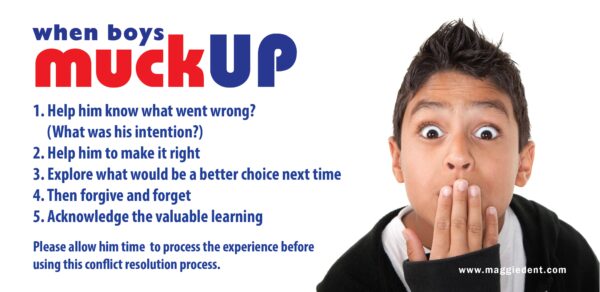Newsletter Articles, Posts for Parents, Raising Adolescents, Raising Boys, Schooling & Homework, Schools: Choosing & Transitioning
A shift of priorities for teen boys in high school.

I am focusing this blog on teen boys as, statistically, they are struggling in high school more than girls. However much of what I write is equally as applicable to teen girls. We do need to remember, though, that generally, boys’ maturity on all levels is often 18 months to 2 years behind most girls.
I can clearly remember having conversations with many of my boy students about how they felt that high school was like a war zone. Many described that they were fighting different battles all day. Then, when they finally were able to go home, in many ways, school followed them because there was homework and parents were always hassling them about school.
During this incredibly transformative, confusing and stressful window in a teen boy’s life, parents and teachers can seem hyper-focused on only one aspect of a teenager’s life – grades. Since I left the classroom, that hyperfocus has become even more intense and with the arrival of test-driven overcrowded curriculums, exhausted teachers chasing grades and accountability can struggle to create the relational safety that is needed before effective learning can happen in classrooms.
I have chatted with many teachers over these last holidays, and they agree that the system is largely broken. Of course, the arrival of the digital world has had a huge impact on the capacity of all students to arrive in class having had a good night’s sleep, and with the necessary dopamine levels to become engaged. School reluctance and school refusal is continuing to rise, as is disengagement in the classroom – which was already quite common amongst boys especially. Also, there is a lack of understanding and support for students who struggle, whether due to being neurodivergent (ND) or who may have a learning difficulty or challenge or who struggle as a consequence of adverse childhood experiences (ACEs) or trauma. The key focus for our boys in high school needs to change. Boys’ behaviour is often a form of communication – seeking connection or in response to stress. Teachers and parents do need to be concerned as their boys head off to the war zone of high school and it could be so helpful to prioritise their wellbeing before their grades.
What was your most challenging experience as a teen boy?
- I was uninspired with school; it seemed pointless and irrelevant for the most part to me
- Coping with undiagnosed depression and lack of self-worth
- Poor mental health
- Learning difficulties – which caused me to feel a lot of shame, embarrassment and vulnerability
- OCD: it happened when I was 14. An unreasonable need to wash my hands and other weird behaviours. Could not pass the front door [if] I saw a car. It passed around 15
- My struggles with depression, anxiety and anorexia
- Struggling with self-worth driven by my confused sexuality
- Being constantly bullied about my body image
- School, struggling academically, not feeling like I had the ability to ask for help
- Being at school and learning using methods to learn that didn’t suit me
- Not being able to make sense of school, couldn’t see what I might use any of it for
- Not being able to deal with the stresses of senior levels of school.
– Men’s Survey results in From Boys to Men (2020).
Let’s shift the focus from grades to health and wellbeing.
Social researcher Daniel Goleman wrote a deceptively profound message in his book Emotional Intelligence many years ago.
Happy, calm children learn best.
To help boys be happy and calm they not only need caring humans they need knowledge so they can navigate the unpredictable journey that adolescence brings – when the child gradually transforms into an adult.
We need to prepare boys for high school.
It is not just about academic learning, it is about massive changes due to puberty. So many boys struggle with the complexity and pressures of high school as well as with socialisation and struggles in the emotional domain. One mum reached out to me after she had given the chapter about brain changes in my book From Boys to Men to her 14-year-old son. His response was:
“Well, it would have been really good to know about this before it happened mum, rather than after.”
There are some key areas that can really help all students in high school.
Sleep
Teens need around 8 to 9 hours of sleep a night, and without that it can impact their health on many levels. It definitely impacts the capacity to learn at school, to cope with stress and to think clearly. Listen to our Parental As Anything episode on why your teen simply must sleep, it’s a goodie.
Nutrition
Ensuring that teens eat nutritionally rich foods can be as tricky as getting toddlers to eat them; however, showing them the evidence about the difference between eating junk food and drinking energy drinks to eating high-quality food could be helpful. Explore cooking with them or making healthy smoothies with them so that they are learning how to take good care of themselves.
Physical activity
Finding what works for each teen is important and getting them outside in the fresh air, away from screens and phones, is beneficial on so many levels. Negotiate even small windows of time outside, getting their heart rates up because this has an enormous impact on their wellbeing. It doesn’t have to be sport, it can be dance, it can be riding a bike, it can be walking the dog, or it can be surfing. If the activity brings joy to their face, that is even better.
Stoke their spark
When teens do something they really enjoy (and wouldn’t it be wonderful if it was their academic studies?), it triggers all sorts of positive neurochemicals in the brain that then flow through the whole body. A sport, a love of music, riding a motorbike, fishing or being an environmental warrior are all possible sources of a spark. Mine was basketball and writing poetry, and I still have a deep love for watching basketball! For some teens the arts are where they find their spark, or it may be cooking or it may be growing vegetables.
If you can prioritise their spark over the pressure you put on your teen for good grades, it can be a win-win.
Dopamine is a key neurochemical that helps with feeling good and being engaged, and it is essential in our classrooms for learning. We need to prioritise whatever it is that creates dopamine naturally. If gaming is your son’s spark, have conversations around how he can do it in healthy ways while still having plenty of time for sleep and physical activity.
Build competence and life skills
The adolescent journey over the bridge to adulthood is where teens are meant to be gaining life skills and confidence so that they can leave home and navigate life independently. This is what life is meant to be about. When a teen becomes competent at something – like driving a car or mastering a new skill in their sports or music, it shifts something significant inside them that helps them feel better about themselves.
The negative critic in their mind that tells them they are ‘useless’ or ‘not good enough’ cannot be as convincing if they have just mastered a new competence.
Preparing your teen to live independently or to travel the world can improve their engagement in the school environment as well. I recommend they develop this list of life skills before they leave home. Many teen boys 16+ can be influenced by how to navigate money and finances as their brain maturity increases. I reckon all teens could benefit from Scott Pape’s book, Barefoot Kids, as it is full of great stories of kids and teens who have been incredibly creative about creating financial abundance.
Effective teen communication
There is a fundamental need for every human to be seen, heard, accepted and loved exactly as they are, not for how they could be one day. When we can communicate respectfully with teens (especially teen boys), when we encourage them to problem-solve, to make plans, to make mistakes and to know that they can still be loved and valued, it means they will turn to their parents when they really struggle rather than turn away.
Be curious, be compassionate and be kind.
Avoid saying things like, ‘What’s got up your nose?’, ‘What’s the matter with you?’ Why are you so grumpy?’. Even grown-ups don’t find these questions helpful for opening conversations when we are struggling.
Positive responses to dilemmas or requests:
- Now that’s interesting!
- Practise your ‘ahhh’. That encourages them to keep talking.
- Have you given that much thought?
- I am curious to know –do you have an idea or a plan to sort this out? What’s your plan?
- Let’s chat about this on the weekend?
- What would you do if….?
- Let me know if and how I can I help.
- I believe you can work this out.
Check out this extract from From Boys to Men, for more big ideas on teen boy communication.

How can we better support our boys through high school?
Middle School
Early puberty for boys is possibly the most difficult stage for them to comprehend and cope with, and this happens during middle school ages 12-14. Something that can really be helpful is to share with your son some of the key changes that are happening or about to happen, which can make things even more confusing.
A key thing to keep in mind always is that a boy’s self-worth tends to be something that he gives himself, when he judges himself as worthwhile or he has ‘done good.’ This is not just academically, it is definitely around his behaviour and his ability to navigate the social dynamics both in school and out of school.
“Challenging behaviour occurs when the demands and expectations placed upon the child outstrip the skills he has to respond adaptively”.
– Dr Ross Greene, Lost at School (2014)
Middle school is a really helpful time to build skills and understandings on how to make choices that don’t hurt themselves, others or the world around them. They need the guidance of safe grown-ups – always have and always will.
An honest chat about body changes that can bring about acne, an unpredictable penis where erections can occur spontaneously, wet patches in the bed in the morning, increase in body odour, growth of pubic and facial hair – also explore the challenges of a growth spurt that can have many different impacts other than endless starvation. Michelle Mitchell’s puberty books.
The surges of testosterone can have many different influences on the body that can give heightened amounts of energy – sometimes while in a classroom – and when combined with a drop in empathy for many boys they can do unpredictable things with no consideration for others, including other students, their parents and their teachers.
There is a significant increase in risk-taking behaviours and this is a normal part of teen boy development. They are hunting dopamine, which gives them a buzz of wellbeing and feel-good hormones especially to escape the angst they can feel
During the teen years, boys tend to function from a larger amygdala, which perceives threats, and they can overreact to things that they didn’t before puberty.
Often, to help manage the heightened stress levels, many boys engage in banter and teasing hoping to create engagement and to help other boys to laugh. This also helps them feel they belong, and often, it can be inappropriate. We need to teach them about the line in the sand.
There can be an increase in impulsive behaviours that can happen at any moment, which is mainly caused by a significant drop in GABA, which is an impulse-inhibiting neurochemical in the brain. They don’t know why they do some impulsive things and often can’t believe some of the things they actually do!
Emotions are heightened for all teens during adolescence, and often when boys feel useless, not good enough, or a failure, they can struggle with heightened levels of frustration, anger and rage. Some boys internalise these feelings into deep worthlessness, sadness and despair. Sadly, this can mean they can give up on school but also on life in general.
Brain pruning can negatively impact organisation skills and memory, and both of these are really important for doing well in high school. Helping them to set up routines to be better organised can be really helpful. I recommend Claire Eaton’s excellent book to help you with this, The Organised Teenager: How to build strong habits that reduce overwhelm, stress and procrastination at home, school and life. Remember you are working with your teen boy to work out joint strategies on how to become better organised. He needs to have some agency in helping himself to improve.
Your boy will muck up, and make poor choices and it is important to help him to learn from these experiences, rather than just punish him.

Avoid shaming, shouting, criticising, using sarcasm, lectures and punishment as they do not teach our boys how to be better, and they merely increase their self-loathing, their sense of worthlessness and the sense of being alone in the world. This increases the intensity of negative self-talk that can sabotage and crush motivation of any kind.
Choose your battles – leave the ‘floordrobe’, or pick up his wet towel sometimes if he is struggling with homework or maths.
Your son does not choose most of his annoying behaviour – he is confused too and often hides big feelings of self-loathing and often thinks he is the only one who is struggling!
High School
The teen brain is continually growing its executive functioning capacity and gradually gets better at navigating the ups and downs of being a young adult. There tends to be an evening-out of abilities and maturity around the age of 16 for boys and girls. Their capacity to make deeper and more lasting friendships that can be more reliable and mutually beneficial improves. This is also the window in which many will be searching their sense of authentic identity – Who am I? Who do I want to be?
Sexual maturity is also evolving exactly as mother nature intended and they will be experiencing desires and yearnings to be intimate with others. Having mature conversations around your family values and expectations around this, from the beginning of middle school, can be helpful. Today’s teens have been raised in a highly sexualised world and sex is seen quite differently to previous generations. Schools cannot be totally responsible for teaching your son or your daughter about how to experience sexual intimacy that is respectful, enjoyable, and enthusiastically consensual. I recommend Cath Hankinson’s work on her website www.sexedrescue.com, and Vanessa Hamilton’s Talking Sex: A conversation guide for parents.
Dr Arne Rubinstein in his excellent work around rites of passage often recommends that we make times to have big conversations with our boys and ask them, “What sort of man do you want to be?” Sometimes our boys will have these conversations with their parents, however often they can find it easier to have these big conversations with lighthouse figures. These are the significant adult allies who create opportunities of connection and safety that allow them to dive deep into who they really are, not who they might be following on TikTok. Marinating our boys in stories of good boys and men who make the world a better place is incredibly important.
Boys on the bridge to manhood are highly influenced during this window either positively or negatively, and we must prioritise surrounding our boys with good humans who can be encouraging and supportive and keep stepping up with the rails on the bridge to ensure that no boy is untethered.
Remember
- No student is defined by their grades.
- Every student will be struggling in some way during high school.
- Stress and anxiety, especially around grades, can negatively compromise a teen’s health and wellbeing.
- Compassion and kindness, especially when it feels least deserved, can be a powerful healing, transformative force.
- Focus on the positives of life and give our lads hope for their future.
- Failure can be a valuable learning experience and not a sign that there is something wrong with you or him.
- Having positive, realistic expectations for your sons is helpful however having too high expectations can be very unhelpful.
Some things that annoy teen boys about expectations:
- the pressure I have to succeed at school because my life depends on it
- academic pressure – being expected to do more than what you can handle
- the workload of school and the pressure and stress that has been piled onto my shoulders all over whether I will succeed and pass or not
- sometimes it just seems too much.
– Teen Boy Survey, From Boys to Men (2020).
Life is a long journey and the journey to adulthood is not complete until the mid to late 20s. There are many pathways to further education beyond high school. Sometimes having a little more maturity and life experience can see a teen boy make a very different decision about what he wants to do with his life than he might have at school. The teen years are full of change, challenge, confusion, uncertainty and often fun and excitement. When we burden our teens, especially our lads, with endless messages about the importance of high grades at school, we miss so much. We miss allowing them the freedom to spread their wings and to explore their world, to come to understand and master being a unique human who is evolving into an adult. When we focus on their health and wellbeing, while building life skills and knowledge, and surrounding them with people who genuinely care about them, they will know they matter, and that they belong and that they are already worthwhile.
Maggie’s book, From Boys to Men: Guiding our teen boys to grow into happy, healthy men published by Pan Macmillan Australia is available in ebook, audiobook and print.
Maggie also ran a From Boys to Men Webinar Series based on the book, including three webinars devoted to the topics of teen boys and motivation, communication, and anger and failure. Sign up for the whole series or watch any of the webinars individually.
Image credit: ©️ michaeljyeung / Deposit Photos




